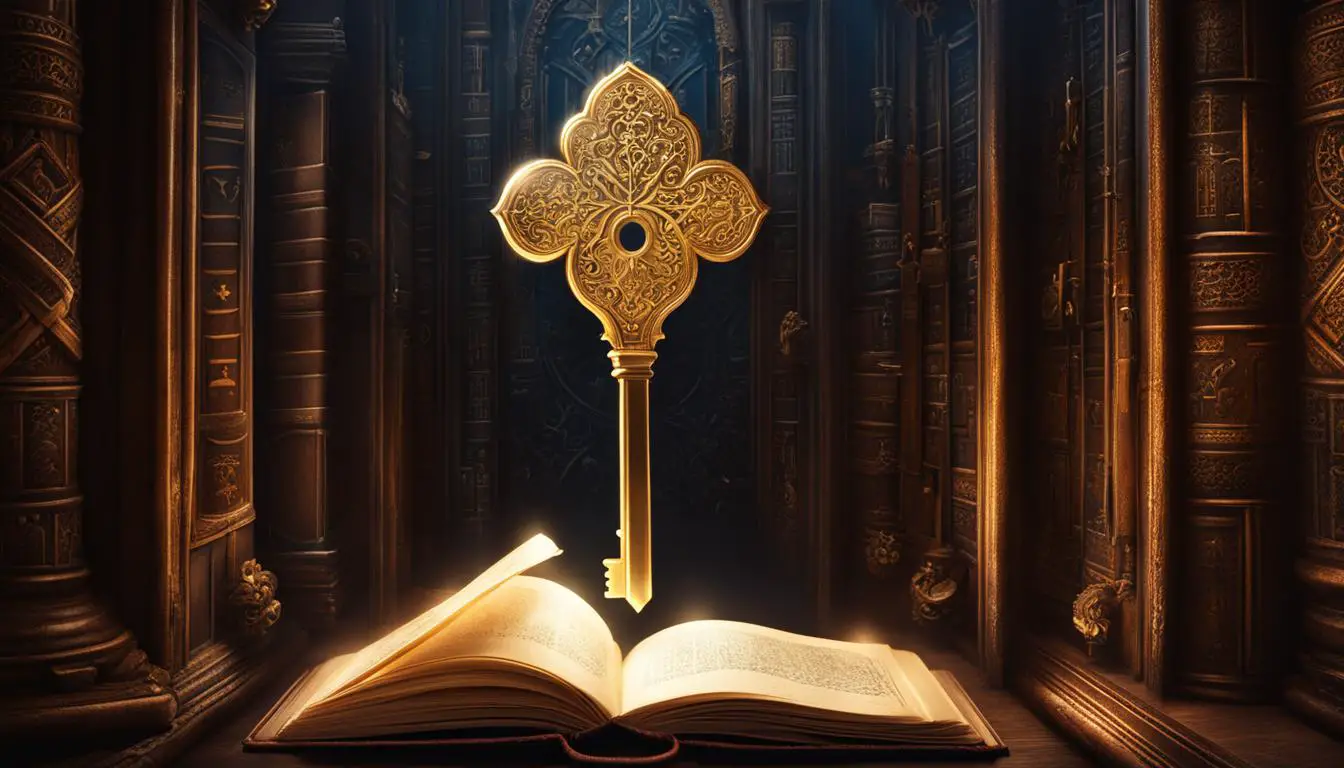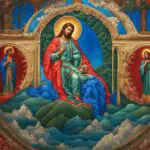In the Bible, the word “crown” holds significant symbolism and represents various concepts. It is translated from different Hebrew and Greek words, each expressing unique meanings. Understanding the biblical meanings of the crown can provide insights into its significance in different passages.
The crown in the Bible signifies position, perseverance, power, prize, and people. It represents the authority and honor bestowed upon kings and queens, as well as the crowning of foreign monarchs. Additionally, the crown symbolizes the dedication to the priesthood, the set-apartness of the high priest and Hebrew kings, and the rewards and recognition for a life of faithful service.
Key Takeaways:
- The word “crown” in the Bible is translated from different Hebrew and Greek words, each expressing unique meanings.
- The crown represents various concepts, including position, perseverance, power, prize, and people.
- There are five Hebrew words for crown: qodhqodh, zer, nezer, aTarah, and kether.
- In the New Testament, there are two Greek words for crown: stephanos and diadema.
- The crown holds deep significance in the biblical narrative, from decoration to consecration, coronation, exaltation, and remuneration.
The Crown of the Head
The Hebrew word qodhqodh refers to the crown of the head. It is also translated as “top of the head,” “scalp,” or “pate.” This word signifies the head as the highest part of the body and can symbolize honor or prominence. It is used in passages such as Genesis 49:26 and Deuteronomy 33:16.
Symbolism and Significance
The crown of the head holds a special significance in biblical literature. As the highest point of the body, it represents authority and prominence. Just as a crown adorns the head of a ruler, the crown of the head symbolizes honor and distinction. In Genesis 49:26, Jacob blesses his son Joseph, saying, “The blessings of your father exceeded the blessings of my ancestors, reaching the utmost bound of the everlasting hills; they shall be on the head of Joseph.” This reference highlights the elevated position and favor bestowed upon Joseph, emphasizing his authority and prominence among his brothers.
“The crown of the head represents honor and distinction, symbolizing the elevated position and authority of individuals.”
Visual Representation
To better understand the concept of the crown of the head, let’s visualize it in the form of a table:
| Symbol | Description |
|---|---|
| The crown of the head signifies honor and prominence, representing the elevated position and authority of individuals. |
The Wreath-Like Crown
In the Bible, the Hebrew word “zer” is used to describe a specific type of crown known as a wreath-like crown. This crown was typically made of gold and adorned with decorative elements. The word “zer” suggests something that is spread around the top as a molding, resembling a wreath. It is mentioned in several passages in Exodus and was used for the furnishings of the tabernacle of Moses, such as the table of shewbread, the ark of the covenant, and the altar of incense.
The wreath-like crown, or “zer,” was primarily used for decorative purposes rather than denoting a specific position or authority. Its intricate design and use of precious materials symbolized beauty and craftsmanship. This type of crown enhanced the aesthetic appeal of the tabernacle and the sacred objects within it.
“The wreath-like crown, or ‘zer,’ was an exquisite piece of craftsmanship. Its intricate design and use of gold made it a visually stunning adornment for the tabernacle and its furnishings.” – Exodus 37:11
By understanding the significance of the wreath-like crown, we gain insight into the importance placed on beauty and craftsmanship in the biblical narrative. It serves as a reminder of the value placed on artistic expression and attention to detail in the worship of God.
| Crown Type | Hebrew Word | Description |
|---|---|---|
| Wreath-Like Crown | zer | A decorative crown made of gold and used for adorning the tabernacle furnishings |
| Consecration Crown | nezer | A crown symbolizing dedication and set-apartness for the high priest and Hebrew kings |
| Royal Crown | aTarah | A circlet or diadem worn by kings and queens, signifying regal power and authority |
| Sovereignty Diadem | kether | A diadem representing the sovereignty and prominence of a ruler |
Table: Types of Crowns in the Bible
The Crown of Consecration
The Hebrew word nezer refers to a crown of consecration. It signifies something “set apart” and holds deep significance in the biblical narrative. This crown was placed on the miter of the high priest, symbolizing their dedication to the priesthood and their consecrated role. Similarly, Hebrew kings also wore the nezer to signify their set-apartness and their authority as rulers.
The use of the nezer crown highlights the importance of consecration and the separation of individuals for specific roles and purposes in the divine plan. It represents the sanctity and divine calling of those who serve as spiritual leaders or rulers. The nezer crown is mentioned in various passages, such as Exodus 29:6, Leviticus 8:9, and 2 Samuel 1:10, emphasizing its significance throughout biblical history.
“The nezer crown is a powerful symbol of consecration and set-apartness in the Bible. It represents the dedication of individuals to their roles as high priests or kings, signifying their authority and divine calling.” – Dr. Elizabeth Davis
The significance of the nezer crown
The nezer crown serves as a visual representation of consecration and the unique position of those who wear it. This crown signifies a divine calling, separating individuals from the ordinary and setting them apart for a specific purpose. It is a reminder of the responsibilities and obligations that come with their roles as spiritual leaders or rulers.
The use of the nezer crown also underscores the idea of divine authority and the recognition of God’s chosen leaders. By wearing the nezer, high priests and Hebrew kings demonstrated their obedience to God’s commands and their commitment to fulfilling their designated roles in the community.
| Verse | Passage |
|---|---|
| Exodus 29:6 | “Put the turban on his head and attach the sacred emblem to the turban.” |
| Leviticus 8:9 | “Then he set the turban on Aaron’s head and placed the golden plate, the sacred emblem, on the front of it, as the Lord commanded Moses.” |
| 2 Samuel 1:10 | “So I stood beside him and killed him, because I knew that after he had fallen he could not survive. And I took the crown that was on his head and the band on his arm and have brought them here to my lord.” |
In conclusion
The nezer crown symbolizes consecration and set-apartness in the Bible. It represents the divine calling and authority of high priests and Hebrew kings, signifying their dedication and recognition as leaders chosen by God. By understanding the significance of the nezer crown, we gain insights into the roles and responsibilities of those who serve in positions of spiritual leadership and rulership.
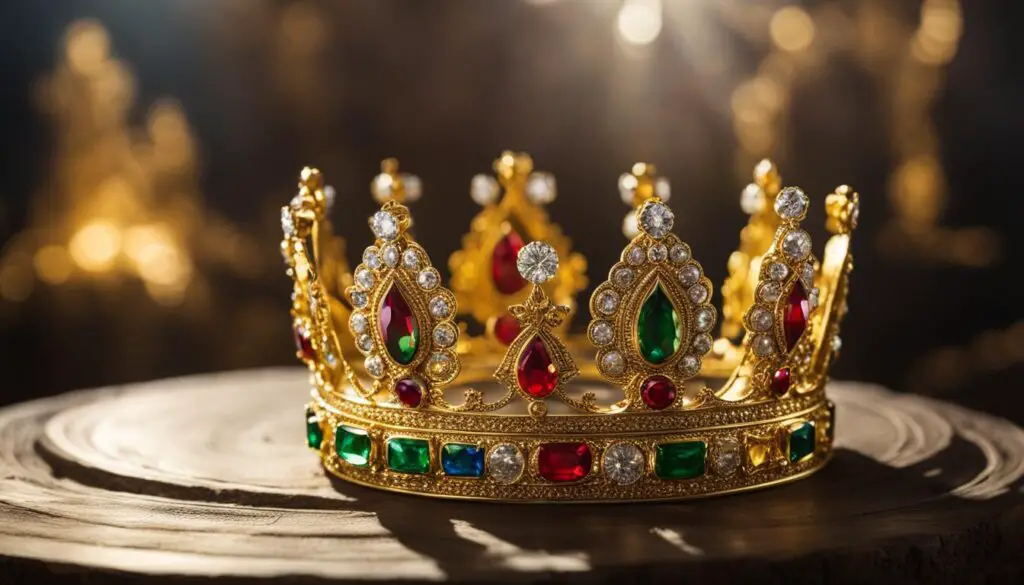
The Crown of Royalty
In the Bible, the Hebrew word “aTarah” represents the crown in its traditional sense, symbolizing regal power and authority. This crown, often translated as a circlet or a diadem, is associated with kings and queens, signifying their royal status. The crown of royalty, mentioned in passages like Esther 8:15 and Job 19:9, represents the sovereignty and dominion of rulers.
Just as a crown adorns the head of a monarch, the crown of royalty represents the honor and exaltation bestowed upon those in positions of power. It serves as a visual reminder of their superior authority and leadership. Through the crown of royalty, rulers are recognized and acknowledged as the rightful bearers of unparalleled regal power.
“And he put on him aTarah and clothed him with garments of fine linen, and put a chain of gold about his neck.”
The crown of royalty, with its ornate and majestic design, captures the essence of kingship, emphasizing the ruler’s divine appointment and divine right to govern. It symbolizes the realm over which they preside and the subjects they govern, reflecting their role as protectors and shepherds of their people.
Table: Symbolism of the Crown of Royalty
| Symbolism | Description |
|---|---|
| Regal Power | Represents the authority and dominion of rulers |
| Honor and Exaltation | Signifies the recognition and glory bestowed upon monarchs |
| Superior Authority | Symbolizes the ruler’s unmatched power and leadership |
| Divine Appointment | Reflects the ruler’s divine right to govern |
| Representation | Epitomizes the realm, subjects, and responsibilities of rulers |
Through its symbolism, the crown of royalty encapsulates the essence of kingship and underscores the authority and responsibility entrusted to those who wear it.
The Diadem of Sovereignty
The Hebrew word kether signifies a diadem or a circlet, representing the sovereignty and prominence of a ruler. This term is used in passages such as Esther 2:17 and Proverbs 14:18. In the context of the biblical narrative, kether symbolizes the authority and honor bestowed upon kings and queens, particularly within the Persian empire.
“And the king loved Esther above all the women, and she obtained grace and favor in his sight more than all the virgins; so that he set the royal kether upon her head and made her queen instead of Vashti.”
The Symbolic Power of Kether
The use of the term kether in the Bible underscores the exalted position and ruling authority of monarchs. The diadem represented by kether signifies the dominion and regal power held by those who wear it. It serves as a tangible reminder of their superior authority and distinguishes them from ordinary individuals.
Just as a diadem encircles the head, the concept of kether highlights the encompassing authority and honor bestowed upon rulers. It is a visual representation of their prominent position and serves as a symbol of their sovereignty.
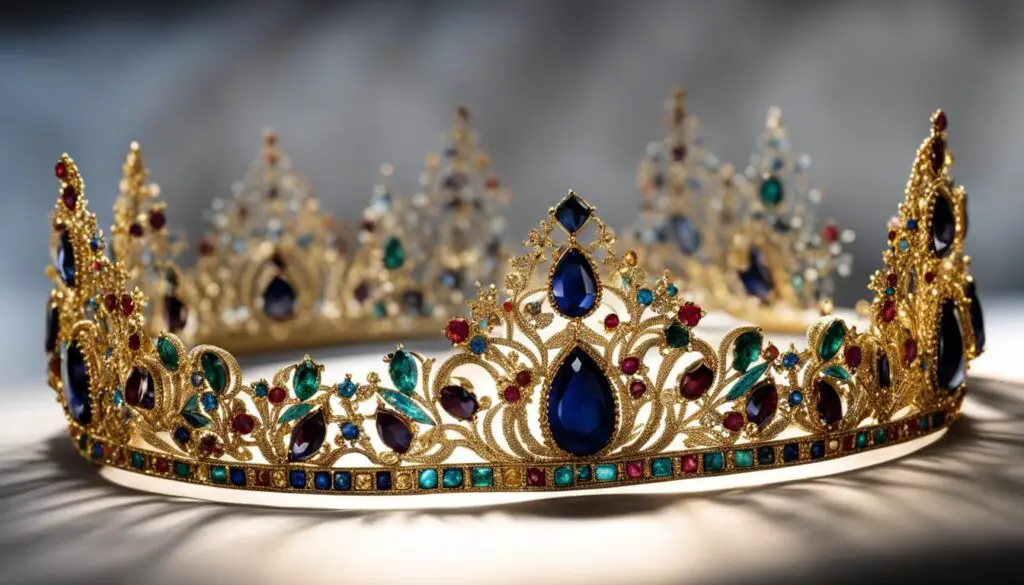
The diadem of sovereignty, represented by the Hebrew word kether, carries deep significance throughout the biblical narrative, reflecting the power and honor associated with rulers. Understanding the symbolic meaning behind kether aids in comprehending the profound implications and status bestowed upon kings and queens, particularly within the context of ancient empires.
The Crown of Victory
In the Bible, the Greek word “stephanos” is used to refer to a crown of victory. This type of crown was a chaplet made of leaves or leaf-like gold, and it was given as a reward to individuals who had achieved success in races, games, or wars. The crown of victory symbolizes the recognition and honor bestowed upon those who have demonstrated exceptional skill, endurance, and dedication.
The concept of the crown of victory is mentioned in several passages of the New Testament. For example, in 1 Corinthians 9:25, the apostle Paul writes, “Everyone who competes in the games goes into strict training. They do it to get a crown that will not last, but we do it to get a crown that will last forever.” Here, Paul uses the metaphor of an athlete striving for a temporary crown to highlight the eternal reward that awaits believers who faithfully serve God.
“They do it to get a crown that will not last, but we do it to get a crown that will last forever.” – 1 Corinthians 9:25
Similarly, in 2 Timothy 4:8, Paul speaks of the crown of righteousness that will be awarded to those who have eagerly anticipated the return of Christ. The crown of victory, in this context, represents the fulfillment and joy that comes from a life dedicated to serving God and standing firm in faith.
Rewards, Recognition, and Eternal Significance
The crown of victory serves as a reminder of the rewards, recognition, and eternal significance that await believers who faithfully follow Christ’s teachings. It encourages perseverance, endurance, and a steadfast commitment to the principles of righteousness and truth. Just as athletes train diligently and endure hardships to win a temporary crown, believers are called to live a life of wholehearted devotion to receive an imperishable crown that represents the ultimate victory in Christ.
| Symbolism | Meaning |
|---|---|
| Recognition | Acknowledgment of achievements and dedication |
| Honor | Esteem and respect given to those who have excelled |
| Reward | Reaping the benefits of perseverance and steadfastness |
| Fulfillment | Achieving the ultimate goal and finding joy in God’s presence |
The crown of victory represents the culmination of a life well-lived, marked by faithful service and unwavering devotion to God. It serves as a reminder of the reward and recognition that awaits those who persevere through trials and tribulations. Just as athletes strive for a temporary crown, believers are called to strive for an imperishable crown that symbolizes eternal significance and the ultimate victory in Christ.
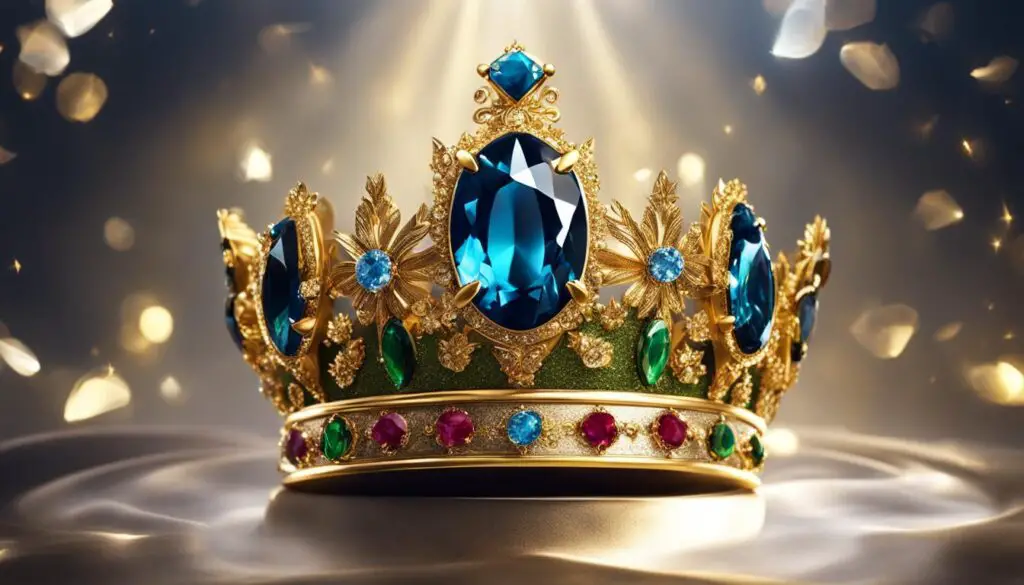
The Crown of Authority
In the Bible, the crown of authority is represented by the Greek word diadema. This crown is a symbol of ruling power, signifying the superior authority of the one who wears it. It takes the form of a bind around the head and is mentioned in the book of Revelation, where it represents the sovereignty and dominion of the dragon, the beast, and the Rider of the White Horse.
The diadema is a powerful symbol of leadership and control, highlighting the position of the wearer as a ruler. It signifies the ultimate authority and commands respect and obedience from others. This crown of authority is a visual representation of the ruling power and dominion that is held by those who are in positions of leadership.
“And he was clothed with a vesture dipped in blood: and his name is called The Word of God. And the armies which were in heaven followed him upon white horses, clothed in fine linen, white and clean. And out of his mouth goeth a sharp sword, that with it he should smite the nations: and he shall rule them with a rod of iron: and he treadeth the winepress of the fierceness and wrath of Almighty God.”
– Revelation 19:13-15
The crown of authority, represented by the diadema, carries significant symbolism in the biblical narrative. It serves as a reminder of the power and dominion that rulers possess and the responsibility that comes with their position. The diadema represents the ability to govern and make decisions that impact the lives of others. It is a symbol of the highest form of authority and embodies the weight of leadership.
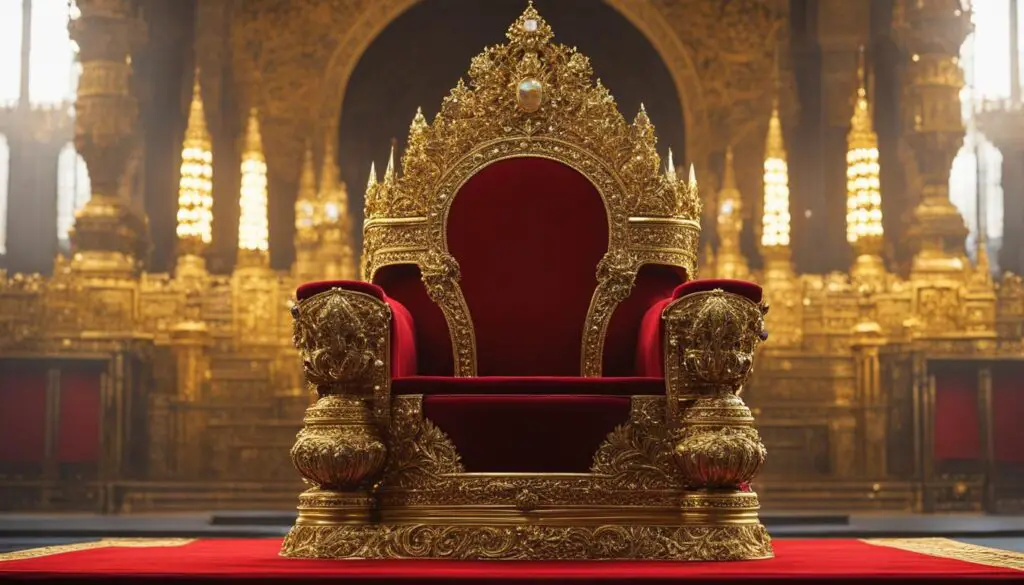
Table: The Symbolism of the Crown of Authority
| Symbolism | Meaning |
|---|---|
| Superior authority | Represents the highest form of ruling power and dominion |
| Leadership | Emphasizes the position of the wearer as a ruler and signifies their ability to govern |
| Responsibility | Carries the weight of leadership and the accountability that comes with it |
The Five Representations of the Crown
In the Bible, the crown is a powerful symbol that represents various concepts and roles. Let us delve into the five main representations of the crown:
- Decoration: The crown functions as an ornamental piece, adorning important elements in biblical narratives. For example, the tabernacle of Moses was adorned with gold crown moldings, representing the beauty and grandeur of God’s dwelling place.
- Consecration: The crown is associated with the high priest and Hebrew kings, signifying their set-apartness and dedication to their roles. The crown of consecration, such as the nezer worn by the high priest, represents their sacred responsibilities and their commitment to serving God and the people.
- Coronation: The crown signifies the crowning of royalty, both within the Hebrew nation and among foreign monarchs. It symbolizes the authority, power, and regal status of kings and queens. Through the crown, rulers are recognized as leaders chosen by divine ordination.
- Exaltation: The crown represents honor, glory, and exaltation. It is bestowed upon individuals who have demonstrated exceptional qualities or fulfilled significant achievements. The crown serves as a symbol of recognition and celebration for their virtues and accomplishments.
- Remuneration: Lastly, the crown represents rewards and joy associated with faithful service. It symbolizes the ultimate prize, the culmination of a life dedicated to God’s work. The crown of remuneration is a testament to the faithful servant’s perseverance, endurance, and commitment to God’s purposes.
These five representations of the crown provide a glimpse into the multifaceted symbolism embedded in biblical narratives. Each portrayal emphasizes different aspects, from mere decoration to the highest form of honor and divine recognition.
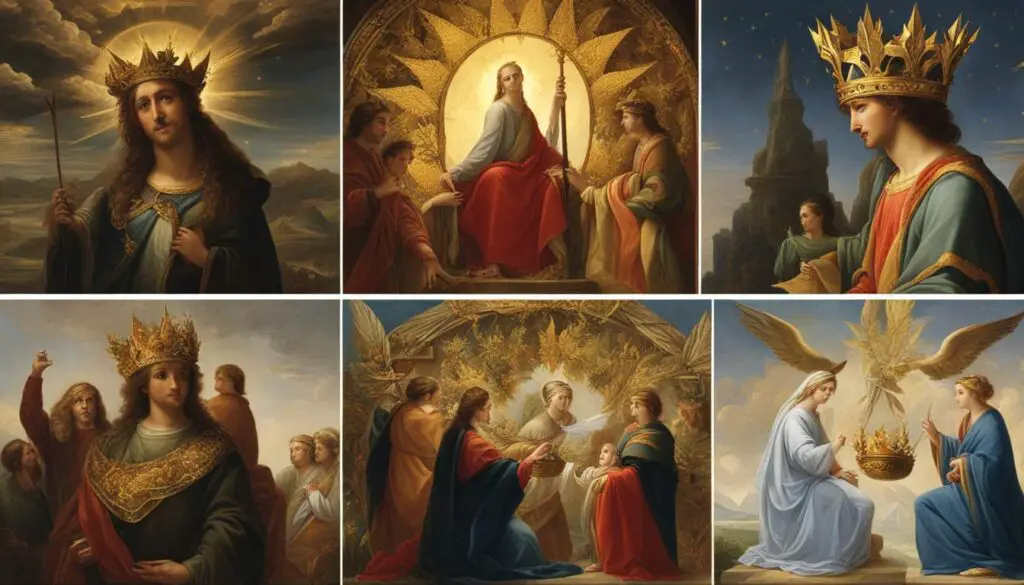
The Significance of the Crown
The crown, regardless of its representation, holds deep symbolism within the biblical context. It serves as a reminder of God’s sovereignty and His chosen vessels for leadership and service. The crown’s meaning transcends mere physical adornment, encompassing spiritual, cultural, and societal significance.
The crown is a powerful visual image that captures the essence of divine appointment, honor, and reward. It reminds believers of their role as ambassadors of Christ, called to live a life that brings glory and honor to His name.
Understanding the various representations of the crown enhances our comprehension of biblical narratives and the messages they convey. It offers insights into the divine intention behind the use of this powerful symbol and the profound implications it holds for our faith and spiritual journey.
Conclusion
The crown holds significant symbolism in the Bible, representing various concepts and roles. It embodies position, perseverance, power, prize, and people. By understanding the biblical meanings associated with the crown, we gain a deeper understanding of its implications in different passages.
From the crown of the head, symbolizing honor and prominence, to the wreath-like crown used for decoration in the tabernacle, each representation carries its own significance. The crown of consecration signifies the set-apartness and dedication of the high priest and Hebrew kings, while the crown of royalty represents regal power and authority.
Additionally, the crown of victory symbolizes the reward and recognition for a life of faithful service, while the crown of authority denotes ruling power. These distinct representations of the crown encompass the concepts of decoration, consecration, coronation, exaltation, and remuneration.
Overall, the crown in the Bible serves as a powerful symbol, reflecting the deep meaning and significance of various biblical concepts. Whether it is adorning the heads of kings and queens, honoring victorious individuals, or representing divine authority, the crown holds a central place in the biblical narrative.
FAQ
What are the different Hebrew words for crown in the Bible?
The different Hebrew words for crown in the Bible are qodhqodh, zer, nezer, aTarah, and kether.
What does the Hebrew word qodhqodh signify?
The Hebrew word qodhqodh signifies the crown of the head, representing honor or prominence.
What is the meaning of the Hebrew word zer?
The Hebrew word zer denotes a chaplet or wreath-like crown made of gold, used for decoration.
What does the Hebrew word nezer represent?
The Hebrew word nezer represents a crown of consecration, signifying something set apart or dedicated.
What is the significance of the Hebrew word aTarah?
The Hebrew word aTarah signifies a circlet or diadem worn by kings and queens, representing regal power and authority.
What does the Hebrew word kether symbolize?
The Hebrew word kether symbolizes a diadem or circlet, representing the sovereignty and prominence of a ruler.
What does the Greek word stephanos refer to?
The Greek word stephanos refers to a crown of victory, used to honor winners of races, games, and wars.
What is the meaning of the Greek word diadema?
The Greek word diadema refers to a crown of authority, symbolizing ruling power and superior authority.
What concepts does the crown in the Bible represent?
The crown in the Bible represents decoration, consecration, coronation, exaltation, and remuneration.
What is the significance of the crown in the biblical narrative?
The crown signifies position, perseverance, power, prize, and people, and holds deep meaning throughout the Bible.

